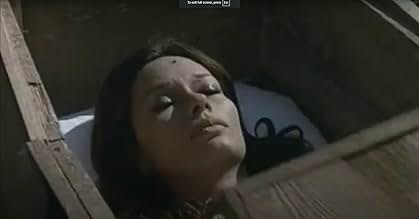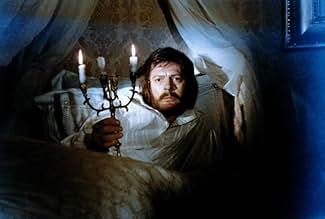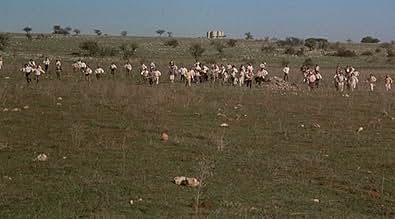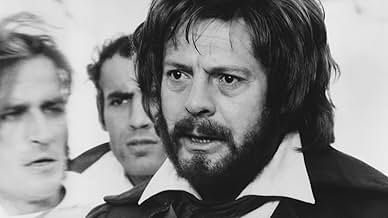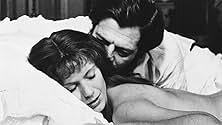IMDb RATING
7.0/10
1.4K
YOUR RATING
A anarchist leader (Fulvio) wishes to retire, as he is old and tired. He tries to hide himself, but his friends find him and insist he carries on helping them.A anarchist leader (Fulvio) wishes to retire, as he is old and tired. He tries to hide himself, but his friends find him and insist he carries on helping them.A anarchist leader (Fulvio) wishes to retire, as he is old and tired. He tries to hide himself, but his friends find him and insist he carries on helping them.
- Directors
- Writers
- Stars
- Awards
- 3 nominations total
- Directors
- Writers
- All cast & crew
- Production, box office & more at IMDbPro
Featured reviews
As an Italian period film taking place in the early 1800s, we get everything we would suppose out of the viewing experience in these two hours. The filming locations are utterly gorgeous, and the production design and art direction are flush with equally beautiful detail. The hair, makeup, and especially the costume design are just as fetching and attentively realized, and even the lighting and cinematography are sights for sore eyes. The stunts and practical effects on hand look terrific, and to much the same point, the cast give firm, commendable performances to bring the drama to bear. It's a compelling if dark and somewhat grim story that brothers Paolo and Vittorio Taviani give us: the story of a bitter, disillusioned revolutionary, and those he cruelly betrays while selfishly seeking a more comfortable life. All along the way one can plainly see and feel how lovingly this was crafted, with some particular odds and ends standing out (including a brief sequence near the end), and the original score of master composer Ennio Morricone is simply a gift. By and large, 'Allonsanfàn' is excellent, and it's well worth watching no matter what one is looking for.
That doesn't mean it's perfect. While Morricone's dominant theme is a treasure - there's a reason Quentin Tarantino would notably borrow it thirty-four years later - I'm struck by how little variety there is in the music, and I can't help but wonder if said theme would be more effective if it were exercised more sparingly. In other regards I'm not so certain what it is that bugs me about the picture, but it arises somewhere between the Taviani's writing and direction. It's a marginal lack of total clarity, perhaps, in how characters are introduced or beats laid out, or maybe a slight lack of finesse: amorphousness and curious hard edges, both at once and made more pronounced by some small tidbits that feel unnecessary or indulgent. None of this is nearly so severe as to specifically detract from the feature, but truthfully I just don't find the whole to be as rich and vibrant as I supposed based on scant foreknowledge. (For the record, said foreknowledge includes two seconds-long clips removed from context, Morricone's theme, and the premise.) 'Allonsanfàn' is solid, engaging, enjoyable, and satisfying, but it's not altogether grabbing or rewarding.
Maybe I'm nitpicking, though. Far more than not we get what we want, and this is well written and well made, a testament to the skills of those involved with regards to both film-making and storytelling, not to mention acting. Scrutinize as we may, all told there's not much going wrong with this title, and to the extent that it falls short it's a matter of semantics, or personal preference, more than substance. I'd stop short of saying 'Allonsanfàn' is a must-see, but whatever your impetus for watching it's well worth checking out, and at length, maybe that's all it needs to be.
That doesn't mean it's perfect. While Morricone's dominant theme is a treasure - there's a reason Quentin Tarantino would notably borrow it thirty-four years later - I'm struck by how little variety there is in the music, and I can't help but wonder if said theme would be more effective if it were exercised more sparingly. In other regards I'm not so certain what it is that bugs me about the picture, but it arises somewhere between the Taviani's writing and direction. It's a marginal lack of total clarity, perhaps, in how characters are introduced or beats laid out, or maybe a slight lack of finesse: amorphousness and curious hard edges, both at once and made more pronounced by some small tidbits that feel unnecessary or indulgent. None of this is nearly so severe as to specifically detract from the feature, but truthfully I just don't find the whole to be as rich and vibrant as I supposed based on scant foreknowledge. (For the record, said foreknowledge includes two seconds-long clips removed from context, Morricone's theme, and the premise.) 'Allonsanfàn' is solid, engaging, enjoyable, and satisfying, but it's not altogether grabbing or rewarding.
Maybe I'm nitpicking, though. Far more than not we get what we want, and this is well written and well made, a testament to the skills of those involved with regards to both film-making and storytelling, not to mention acting. Scrutinize as we may, all told there's not much going wrong with this title, and to the extent that it falls short it's a matter of semantics, or personal preference, more than substance. I'd stop short of saying 'Allonsanfàn' is a must-see, but whatever your impetus for watching it's well worth checking out, and at length, maybe that's all it needs to be.
In early 19th century Italy a middle aged radical called Fulvio Imbriani (Marcello Mastroianni) finds his loyalty and commitment to his political comrades being tested after he is released by the Italian regime. Released in1974 writer/directors Paolo and Vittorio Taviani's feature film is a historical melodrama set during 'The Restoration', and filmed in a mix of opulent settings, and at times bare landscapes and lakes. Dealing with a similar theme to the Taviani's previous film 'St. Michael Had a Rooster', like that film it has a certain amount of comparatively complex psychologising and irony about the mental trauma of a revolutionary whose faith in the cause is slipping. It's a story of the ties of family and the past, the corruption of class, self-interest, and the power of money and position, versus political commitment and conviction, and general communal interest. A lot of the film's effect is achieved through a kind of 'visual psychology' encompassing colour, landscape, set, composition, movement, and other visual devices ( this is a good visual film with cinematography by Giuseppe Ruzzolini), combined with music, to create a film parts of which almost seem like a kind of train of thought. In the words of 'La Marseillaise' - 'Allons Enfants/Arise Children', from the lies and fantasy of your world.
Of course you have to like the Taviani brothers style, something rather hard for viewers contaminated with the fast moving, predictable (even when trying hard to be unpredictable) plots of Hollywood McDonalds-style commercial movies. Taviani brothers take a bitter look at Italy of the '70's, the time when several leftist revolutionary groups, like the Brigade Rosse, the Autonomia Operaia and the Lotta Continua, chose the path of armed struggle against Italian capitalism, ending in a horrible massacre of politicians, judges, and innocent people. Just like them Fulvio, is of a wealthy, aristocratic origin and his revolutionary stance is just sentimental, not backed by real-life status. He gets easily disillusioned, but, caught in a moving sand, however he struggles to reclaim his past life he gets trapped and is swallowed in the end. It is hard to watch a film that you cannot identify with anyone, but it is worth a try.
It is my first encounter with Taviani brothers' work, my instant gut-feeling is that this surrealistic political-drama about a traitor's ill-fated fallout is perhaps blemished by the incompatibility of our generation, I reluctantly pigeonhole it to those films inevitably go astray from their glorious road along the unstoppable torrent of time!
Marcello Mastroianni this time around employs a substantially anti-hero persona opponent to his more audience-friendly role as the marquee Italian dream-lover. An abnormally bitter repugnance exudes from his character brims with all the screen time and I can sense a tint of misogyny levitating in the air with an inexplicably compelling thespian vibe. The lesser characters are all one-dimensional notwithstanding, a feral Lea Massari (from THE ADVENTURE) still could draw some attention for her very underdeveloped role.
All the sectors are somehow quirky enough to create certain discontinuity in the narrative, which could be a deliberate novelty at that time, but fails to leave sympathetic impression throughout, plus without the adequate stewing time, I might wonder it might be too hasty for audience to ruminate or even reflect the actual happening in the film, especially for a foreigner.
Marcello Mastroianni this time around employs a substantially anti-hero persona opponent to his more audience-friendly role as the marquee Italian dream-lover. An abnormally bitter repugnance exudes from his character brims with all the screen time and I can sense a tint of misogyny levitating in the air with an inexplicably compelling thespian vibe. The lesser characters are all one-dimensional notwithstanding, a feral Lea Massari (from THE ADVENTURE) still could draw some attention for her very underdeveloped role.
All the sectors are somehow quirky enough to create certain discontinuity in the narrative, which could be a deliberate novelty at that time, but fails to leave sympathetic impression throughout, plus without the adequate stewing time, I might wonder it might be too hasty for audience to ruminate or even reflect the actual happening in the film, especially for a foreigner.
The political prisoner Fulvio Imbriani (Marcello Mastroianni) is released ill from prison and the authorities expect to find his rebel friends though him. However, he returns to his family's real state and recovers his health with his siblings. When his lover Charlotte (Lea Massari) unexpectedly arrives in the property, she stays with Fulvio but his sister overhears Charlotte telling that their friends would be arriving on the next morning and calls the authorities. The soldiers kill a great number of revolutionaries but Fulvio escapes with Charlotte that was shot on the back. She dies and Fulvio travels with his comrades but without enthusiasm. Sooner he betrays the group, trying to flee to United States with the money of the revolutionaries and his new lover Francesca (Mimsy Farmer).
"Allonsanfàn" is boring story with a messy lead character and a terrible screenplay that is awfully developed. It is never clear where and when the story takes place; the characters come and go without any explanation or previous development – the viewer never knows who they are or their relationship; Fulvio's motives are confused and never clear, and it is never clear why this amoral bourgeois is a leader of the revolutionaries (or bandits?). There is one ridiculous scene with a frog where the directors are probably trying to give the status of cult to this overrated movie. My vote is four.
Title (Brazil): "Allonsanfan"
"Allonsanfàn" is boring story with a messy lead character and a terrible screenplay that is awfully developed. It is never clear where and when the story takes place; the characters come and go without any explanation or previous development – the viewer never knows who they are or their relationship; Fulvio's motives are confused and never clear, and it is never clear why this amoral bourgeois is a leader of the revolutionaries (or bandits?). There is one ridiculous scene with a frog where the directors are probably trying to give the status of cult to this overrated movie. My vote is four.
Title (Brazil): "Allonsanfan"
Did you know
- TriviaTitle derived from the first two words of the French national anthem.
- ConnectionsEdited into Marcello, una vita dolce (2006)
- How long is Allonsanfan?Powered by Alexa
Details
Box office
- Gross worldwide
- $782
- Runtime
- 1h 55m(115 min)
- Sound mix
- Aspect ratio
- 1.85 : 1
Contribute to this page
Suggest an edit or add missing content

